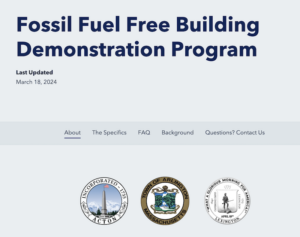Who is a member?
Our members are the local governments of Massachusetts and their elected and appointed leadership.
Mass Innovations, From The Beacon, May 2024

The towns of Acton, Arlington and Lexington have teamed up to create a website to explain new fossil fuel-free building rules.
Five years after the first town meeting attempt to limit fossil fuel hookups in building projects, municipal fossil fuel-free bylaws have started becoming a reality in Massachusetts communities.
As of late April, following numerous town meeting votes, home rule petitions, attorney general opinions, legislative actions and regulatory updates, eight communities have received state approval to roll out bylaws limiting the use of fossil fuels in major renovations and new construction.
Brookline — the first community on the East Coast to attempt such a ban following a 2019 Town Meeting vote — started enforcing its bylaw on Feb. 20.
“I think the community is elated to be at the forefront of this work that it has been trying to do for so long,” said Brookline Town Manager Chas Carey. “But now this is really … where we have to do the hard work of implementing this.”
Brookline is participating in the state’s Municipal Fossil Fuel Free Building Demonstration Program, which allows up to 10 communities to limit fossil fuel infrastructure. Lawmakers created the program as part of a 2022 climate and clean energy law, after Brookline’s Town Meeting actions failed to clear legal review by the Attorney General’s Office, and after Brookline and other communities pursued home rule petitions seeking the ability to regulate fossil fuel infrastructure at the local level.
Acton, Aquinnah, Arlington, Cambridge, Concord, Lexington and Lincoln have also gotten the final go-ahead to proceed with their bylaws. Aquinnah’s bylaw took effect on Jan. 1, and several more have since gone into effect. Bylaws in Concord and Lincoln will start on June 22.
As these laws have progressed, Brookline’s Building Department has reached out to other building departments to compare notes, said Paul Campbell, Brookline’s deputy building commissioner.
Applications from additional communities are pending. Newton received conditional approval in December, pending a state determination regarding its compliance with the MBTA Communities law, according to the Department of Energy Resources.
West Tisbury withdrew its application due to its inability to meet the program’s housing production thresholds, but Somerville and Northampton submitted applications to fill the 10th slot.
The bylaws of participating communities remain works in progress. The bylaws are similar, but vary in their language, and the DOER has recommended revisions in some.
Lexington Town Meeting updated its bylaw language in early April, and Concord Town Meeting was expected to take up revisions in late April to address DOER recommendations.
Lexington’s participation in the program continues a tradition of environmental action, according to Select Board Member Mark Sandeen. Lexington was one of the first to adopt the stretch energy code back in 2010, and its work with the DOER helped inspire adoption of similar codes nationwide. As with previous efforts, public outreach will be key, Sandeen said.
“I think the number one thing that we’re going to need to do is to provide resources to help people make these decisions on their own and feel comfortable that they’re making a good decision for their home,” Sandeen said.
The fossil fuel-free program also comes as the state’s building rules have undergone significant changes in just a few short years, including updates to the state’s base energy code and stretch energy code, and the addition of the Specialized Opt-In Stretch Energy Code, which allows municipalities to adopt even stricter local building codes.
Municipalities now face the challenge of explaining these changes. In Brookline, officials said they are connecting stakeholders to town documents and website information, and to the DOER’s website, and are planning to use $20,000 in American Rescue Plan Act funds for training about fossil fuel-free compliance.
Acton, Arlington and Lexington joined forces to launch a website explaining the local fossil fuel-free rules and providing information on the Specialized Opt-In Stretch Energy Code. The fossil fuel-free bylaws in Lexington and Acton took effect on March 21, and Arlington’s will begin on May 21.
“Our hope is that this will streamline the process for builders and developers, who can find the information in one site, including details on the new building code and the incentives for new building construction or major renovations to be fossil fuel-free,” said Andrea Becerra, Acton’s sustainability director. “In addition, collaboration between three different communities simplifies the process internally as well. We no longer have to build multiple resources from scratch.”
Talia Fox, Arlington’s sustainability manager, said the collaboration makes sense because the towns’ development is similar in scale. She said this program will help reduce building emissions now and avoid costly retrofits in the future.
“We are also eager to learn from our experiences in the demonstration program,” she said, “and share those learnings with communities around the state and the country.”